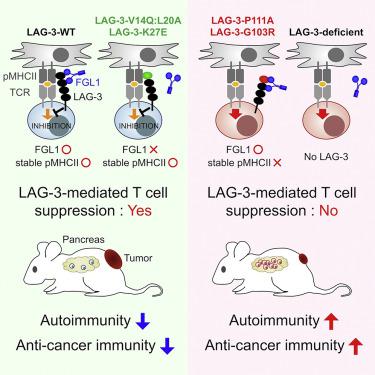Immunity ( IF 25.5 ) Pub Date : 2022-04-11 , DOI: 10.1016/j.immuni.2022.03.013 Takumi Maruhashi 1 , Daisuke Sugiura 1 , Il-Mi Okazaki 2 , Kenji Shimizu 1 , Takeo K Maeda 3 , Jun Ikubo 3 , Harunori Yoshikawa 4 , Katsumi Maenaka 5 , Naozumi Ishimaru 6 , Hidetaka Kosako 4 , Tatsuya Takemoto 7 , Taku Okazaki 2

|
Lymphocyte activation gene-3 (LAG-3) is a potent inhibitory co-receptor; yet, its functional ligand remains elusive, with distinct potential ligands identified. Here, we investigated the relative contribution of potential ligands, stable peptide-MHC class II complexes (pMHCII) and fibrinogen-like protein 1 (FGL1), to LAG-3 activity in vitro and in vivo. Binding of LAG-3 to stable pMHCII but not to FGL1 induced T cell suppression in vitro. Consistently, LAG-3 mutants lacking FGL1-binding capacity but not those lacking stable pMHCII-binding capacity retained suppressive activity in vitro. Accordingly, targeted disruption of stable pMHCII- but not FGL1-binding capacity of LAG-3 in NOD mice recapitulated diabetes exacerbation by LAG-3 deficiency. Additionally, the loss of stable pMHCII-binding capacity of LAG-3 augmented anti-cancer immunity comparably with LAG-3 deficiency in C57BL/6 mice. These results identify stable pMHCII as a functional ligand of LAG-3 both in autoimmunity and anti-cancer immunity. Thus, stable pMHCII-LAG-3 interaction is a potential therapeutic target in human diseases.
中文翻译:

LAG-3 与稳定的肽-MHC II 类结合会限制 T 细胞功能并抑制自身免疫和抗癌免疫
淋巴细胞活化基因 3 (LAG-3) 是一种有效的抑制性辅助受体;然而,它的功能性配体仍然难以捉摸,已经确定了不同的潜在配体。在这里,我们研究了潜在配体、稳定肽-MHC II 类复合物 (pMHCII) 和纤维蛋白原样蛋白 1 (FGL1) 对 LAG-3体外和体内活性的相对贡献。LAG-3 与稳定的 pMHCII 但不与 FGL1 的结合在体外诱导了 T 细胞抑制。一致地,缺乏 FGL1 结合能力的 LAG-3 突变体,但不是那些缺乏稳定 pMHCII 结合能力的突变体,在体外保留了抑制活性. 因此,在 NOD 小鼠中,LAG-3 的稳定 pMHCII 结合能力而非 FGL1 结合能力的靶向破坏概括了 LAG-3 缺乏导致的糖尿病恶化。此外,与 C57BL/6 小鼠中 LAG-3 缺乏相比,LAG-3 稳定 pMHCII 结合能力的丧失增强了抗癌免疫力。这些结果将稳定的 pMHCII 鉴定为 LAG-3 在自身免疫和抗癌免疫中的功能配体。因此,稳定的 pMHCII-LAG-3 相互作用是人类疾病的潜在治疗靶点。










































 京公网安备 11010802027423号
京公网安备 11010802027423号